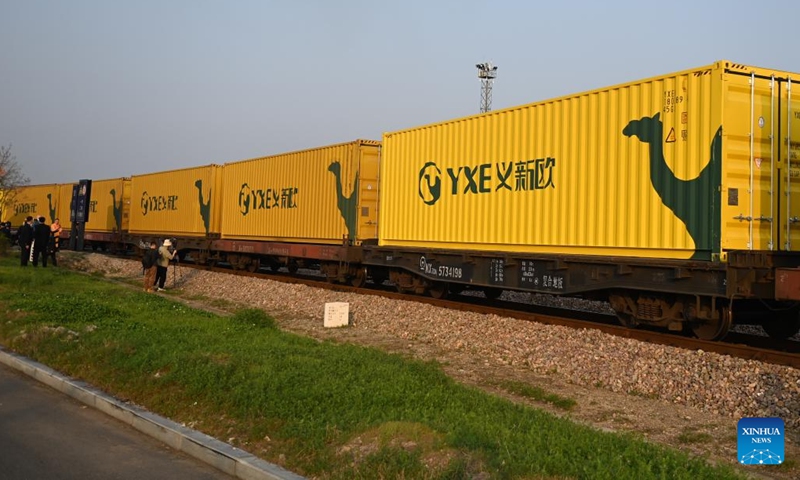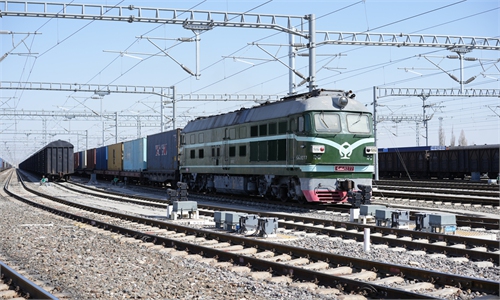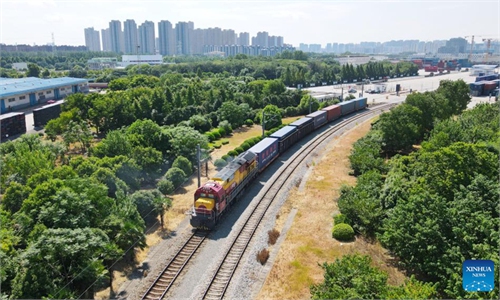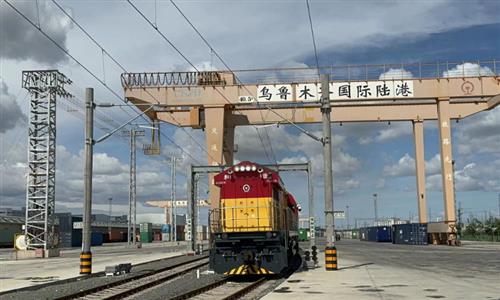Yiwu-Xinjiang-Europe Tashkent Center inaugurated in Uzbekistan as China deepens international trade ties

A freight train departs from Yiwu West Railway Station in Yiwu, East China's Zhejiang Province. File photo: Xinhua
The Yiwu-Xinjiang-Europe Tashkent Consolidation Center was officially inaugurated in Tashkent, capital of Uzbekistan, at 10 am local time on Monday, according to a statement Yiwu municipal authorities sent to the Global Times, highlighting China's growing trade connectivity with Central Asian and European markets.
The Yiwu-Xinjiang-Europe Tashkent Consolidation Center is located near the outer ring road of Tashkent, about 20 kilometers from the city center and major railway stations. Covering 4.57 hectares, the site includes a 6,000-square-meter warehouse, a 600-square-meter office building, and 35,000 square meters of paved yard space. It also features a dedicated 1,200-meter railway line. The total investment amounted to about $9 million, according to the statement.
An official from Yiwu in East China's Zhejiang Province, who declined to be identified, told the Global Times on Monday that the center offers tailored services for clients engaged in Uzbekistan trade. "The yard accommodates both empty and loaded containers, with dedicated rail lines for cargo handling. Our customs-supervised warehouse provides bonded storage, facilitating efficient customs clearance and warehousing," he said.
"As a consolidation and distribution hub, the center handles a wide range of imports - including electrical appliances, polyester chips, machinery and industrial raw materials - and Uzbek exports such as cotton yarn, potassium chloride and mung beans, all of which can be assembled and dispatched via the Yiwu-Xinjiang-Europe freight train service," the Yiwu official said.
According to the official, the center also functions as an international transit hub, consolidating goods from neighboring countries for re-export to China and beyond. "At the same time, cargo from China and other regions arriving in Tashkent is redistributed by rail and truck to Central Asian markets such as Tajikistan, Kyrgyzstan, Turkmenistan and Afghanistan," he noted.
China-Europe freight trains have spurred the development of new logistics hubs, industrial parks and trade centers abroad. For example, the Małaszewicze terminal in Poland has seen a surge in traffic, significantly boosting the local economy, according to a People's Daily's report on Monday.
The China-Europe Railway Express has operated more than 105,000 trips to date, including return journeys, the People's Daily reported. Domestically, 93 scheduled routes with a maximum speed of 120 kilometers per hour connect 125 cities, while internationally, the service links 227 cities in 25 European countries and more than 100 cities in 11 Asian countries, according to the report.
"Over the years, the China-Europe freight trains have significantly boosted cross-border connectivity and economic exchanges by enhancing transport efficiency, shortening delivery times, and facilitating the seamless flow of goods, particularly among Belt and Road Initiative partner countries," Sun Zhang, a railway expert at Shanghai Tongji University, told the Global Times in a previous interview.
Sun said that the trains offer new opportunities for China's central and western areas. "The launch of China-Europe freight trains enhances connectivity between central and western China and Europe, with customs now established in Chinese inland cities. This has boosted trade flows, balancing economic growth with the eastern coastal areas," said Sun.
The launch of the Yiwu-Xinjiang-Europe Tashkent Consolidation Center represents a new phase in the Yiwu-Xinjiang-Europe route's expansion in the region and further strengthens the China-Europe freight train supply chain ecosystem, enhancing the brand's value and influence in overseas markets, according to the statement.



